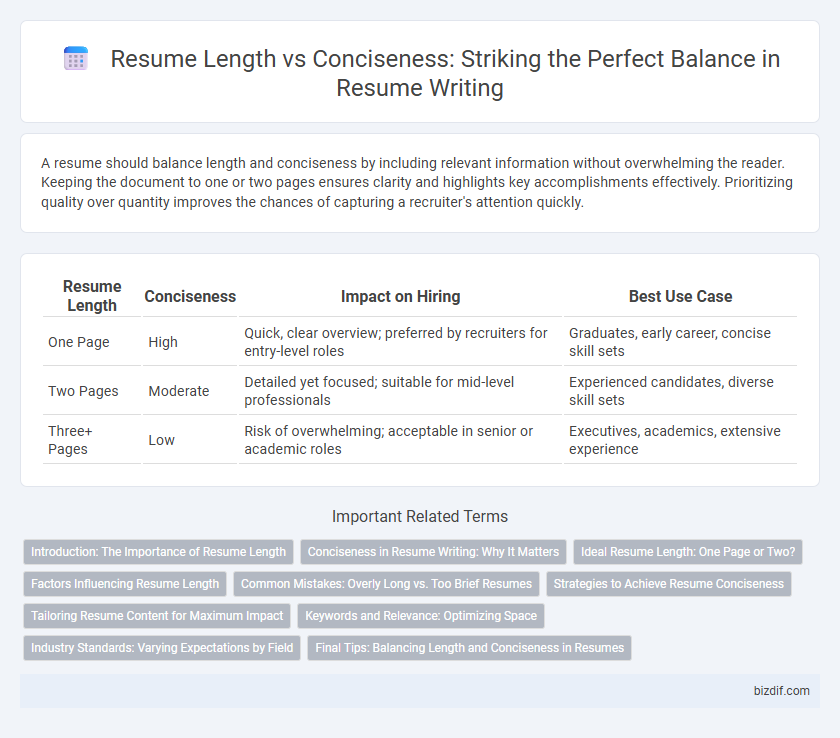A resume should balance length and conciseness by including relevant information without overwhelming the reader. Keeping the document to one or two pages ensures clarity and highlights key accomplishments effectively. Prioritizing quality over quantity improves the chances of capturing a recruiter's attention quickly.
Table of Comparison
| Resume Length | Conciseness | Impact on Hiring | Best Use Case |
|---|---|---|---|
| One Page | High | Quick, clear overview; preferred by recruiters for entry-level roles | Graduates, early career, concise skill sets |
| Two Pages | Moderate | Detailed yet focused; suitable for mid-level professionals | Experienced candidates, diverse skill sets |
| Three+ Pages | Low | Risk of overwhelming; acceptable in senior or academic roles | Executives, academics, extensive experience |
Introduction: The Importance of Resume Length
Resume length significantly impacts hiring managers' first impressions, with concise resumes ranking higher in readability and effectiveness. Optimal resume length typically ranges between one to two pages, balancing comprehensive experience presentation with brevity and clarity. Overly lengthy resumes risk losing recruiter interest, while overly brief ones may omit critical achievements and skills.
Conciseness in Resume Writing: Why It Matters
Conciseness in resume writing ensures that key skills, experiences, and accomplishments are communicated clearly within one to two pages, increasing the likelihood of capturing recruiters' attention quickly. Employers typically spend only six seconds scanning a resume, making brevity critical without sacrificing essential details or impact. A concise resume highlights relevant qualifications efficiently, improving readability and strengthening the overall professional narrative.
Ideal Resume Length: One Page or Two?
A one-page resume is ideal for recent graduates or candidates with less than 10 years of experience, ensuring concise presentation of skills and achievements. Two-page resumes suit professionals with extensive work history or specialized expertise, allowing detailed coverage without overwhelming hiring managers. Prioritizing clarity and relevance over length improves resume effectiveness and increases interview opportunities.
Factors Influencing Resume Length
Resume length is influenced by factors such as career experience, industry standards, and job level; entry-level candidates typically use one-page resumes, while senior professionals often require two or more pages to detail extensive achievements. The balance between conciseness and completeness depends on tailoring content to highlight relevant skills and accomplishments without overwhelming the reader. Optimizing resume length involves prioritizing impact-driven information and avoiding unnecessary details that do not support the targeted role.
Common Mistakes: Overly Long vs. Too Brief Resumes
Resumes often suffer from common mistakes such as being overly long or too brief, leading to reduced effectiveness. An optimal resume length balances detail and brevity, typically one to two pages, ensuring key skills and achievements are clearly highlighted without overwhelming recruiters. Conciseness paired with relevant information enhances readability and increases the chances of passing applicant tracking systems (ATS).
Strategies to Achieve Resume Conciseness
Limiting a resume to one or two pages enhances readability and increases the chances of capturing recruiters' attention quickly. Prioritizing relevant skills and achievements while eliminating redundant or outdated information streamlines the content effectively. Utilizing bullet points, action verbs, and quantifiable results ensures a concise, impactful presentation that aligns with job descriptions.
Tailoring Resume Content for Maximum Impact
Tailoring resume content for maximum impact requires balancing length and conciseness by prioritizing relevant skills, achievements, and experiences specific to the target job. A focused resume, ideally one to two pages, highlights key qualifications that align with the employer's needs, avoiding unnecessary details that dilute the message. Using quantifiable results and industry keywords enhances clarity and ensures the resume passes applicant tracking systems (ATS) while engaging hiring managers effectively.
Keywords and Relevance: Optimizing Space
Resume length should balance brevity and detail, ensuring every word adds value and highlights key qualifications. Prioritizing industry-specific keywords enhances applicant tracking system (ATS) compatibility and improves visibility to recruiters. Maximizing relevance by tailoring content to the job description optimizes space and increases the chances of securing an interview.
Industry Standards: Varying Expectations by Field
Resume length and conciseness vary significantly across industries, with technology and creative fields favoring one-page resumes to maintain focus and readability, while academia or healthcare often accept multi-page formats due to detailed experience requirements. Industry standards dictate tailoring resume length to balance comprehensive information with succinct presentation, enhancing relevance and impact for recruiters. Understanding these field-specific expectations helps candidates optimize content, ensuring critical skills and achievements are highlighted without overwhelming the reader.
Final Tips: Balancing Length and Conciseness in Resumes
Effective resumes balance length and conciseness by prioritizing relevant experience and clear, impactful language. Keeping a resume to one or two pages ensures recruiters can quickly assess qualifications without sifting through unnecessary information. Tailoring content to the job description enhances clarity while maintaining brevity, maximizing the resume's overall effectiveness.
Resume length vs conciseness Infographic

 bizdif.com
bizdif.com